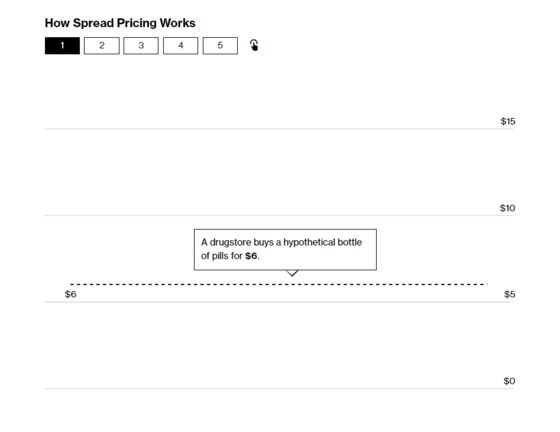Drug Middlemen Got Big Markup in New York, Pharmacists Say
Drug Middlemen Got Hefty Markup in New York, Pharmacy Group Says
(Bloomberg) -- Pharmacy-benefit managers are taking increasingly large markups on generic drugs in New York, according to an analysis of Medicaid prescriptions at independent pharmacies in the state.
In Medicaid, private insurers are paid by the state to cover low-income citizens. The insurers in turn usually contract with pharmacy-benefit managers, or PBMs, paying them to provide drug coverage. PBMs run by CVS Health Corp., Cigna Corp. and UnitedHealth Group Inc. then bill insurers for coverage, and reimburse pharmacies for drugs.
For years, small pharmacy owners have been complaining that PBMs have been shortchanging them, cutting to unsustainable amounts the reimbursement they get for dispensing prescriptions to millions of Americans. Drugstores have also claimed that PBMs are charging larger per-prescription amounts to their insurer and employer clients -- and sometimes pocketing the difference.
A Bloomberg analysis this year of 90 frequently prescribed generic drugs in Medicaid managed-care plans in 31 states found wide variations in reimbursement and drug cost from state to state. In some states, Medicaid plans appear to be getting a good deal, Bloomberg reported earlier this year. In others, plans pay markups of threefold or more on some treatments, the Bloomberg analysis found. But Bloomberg’s analysis couldn’t tell how much of the markup was going to PBMs and other middlemen, versus how much was going to pharmacies.
Pharmacist Study
The new analysis sponsored by the Pharmacists Society of the State of New York is one of the first efforts to quantify that spread in private Medicaid plans that cover about 4.3 million New York state residents. The state society has been a critic of the PBM industry and represents pharmacy owners upset over declining reimbursements.
In 2017, PBMs paid independent New York pharmacies in the analysis an average of $10.85 per generic-drug prescription. Private health plans that provide state-financed Medicaid coverage reported a cost of $14.34 per prescription. That represents a markup of 32 percent over what pharmacies were paid. The markups by PBMs more than doubled from 2016, according to the analysis.

Drug costs have become a major national issue for patients and politicians. Along with scrutiny of pharmaceutical companies that manufacture drugs, distributors, insurance companies and middlemen like PBMs have attracted attention for their role in health costs. State officials, in particular, have looked at how PBMs function in Medicaid, which relies on getting low prices to cover as many low-income people as possible.
Middlemen “are taking an increasing share of the margin on generic drugs” in New York, said Eric Pachman, a consultant at 3 Axis Advisors and former pharmacy executive who conducted the study. While PBMs often keep the spread on generic drugs, the analysis can’t rule out that some of the spread was shared by PBMs with their health plans clients, Pachman said.
The Pharmaceutical Care Management Association, a trade group representing PBMs, said that drugstores are overpaid in the New York Medicaid program.
“New York’s Medicaid program wastes millions every year by overpaying drugstores,” said Charles Cote, a spokesman for the group. “By defending wasteful spending in a program that’s clearly in trouble, New York’s special interest drugstore lobby wants to rearrange deck chairs on the Titanic without offering ways to keep Medicaid afloat.”
PBMs, including CVS’s Caremark unit and Cigna’s Express Scripts unit, have said that spread pricing adds stability and predictability to drug costs for their clients. Health plans freely choose the spread arrangements over other fee-based options, they have said.
PBMs’ health-plan clients “are highly sophisticated purchasers” that negotiate exactly the type of contract they want, Cote said. Rates paid to pharmacies are designed to incentivize drugstores to manage their generic-drug inventory so PBM clients don’t overpay, he said.
The society’s analysis looked at payment data from 11 independent pharmacies around New York State, which included claims paid by 17 different private Medicaid plans. Those data were compared to a federal database of Medicaid spending. While the results are likely to be similar at other independent pharmacies, they don’t include data from large chains that may have more bargaining power, said Pachman.
The New York analysis follows a report by Ohio that also dug into the practice in great detail. The full Ohio report hasn’t been released publicly.
On Jan. 20, the Columbus Dispatch reported that an unredacted version of the Ohio report showed that CVS had been paying some large competitors, including Walmart Inc., far less than it was paying its own pharmacies in Ohio’s Medicaid managed care program.
CVS oversees drug benefits for about 94 million people in the U.S., while also operating about 9,800 pharmacies. CVS declined to comment on the New York report.
OptumRx, the third big drug benefit manager, is a unit of insurer UnitedHeath Group Inc.
To contact the reporter on this story: Robert Langreth in New York at rlangreth@bloomberg.net
To contact the editors responsible for this story: Drew Armstrong at darmstrong17@bloomberg.net, Timothy Annett
©2019 Bloomberg L.P.